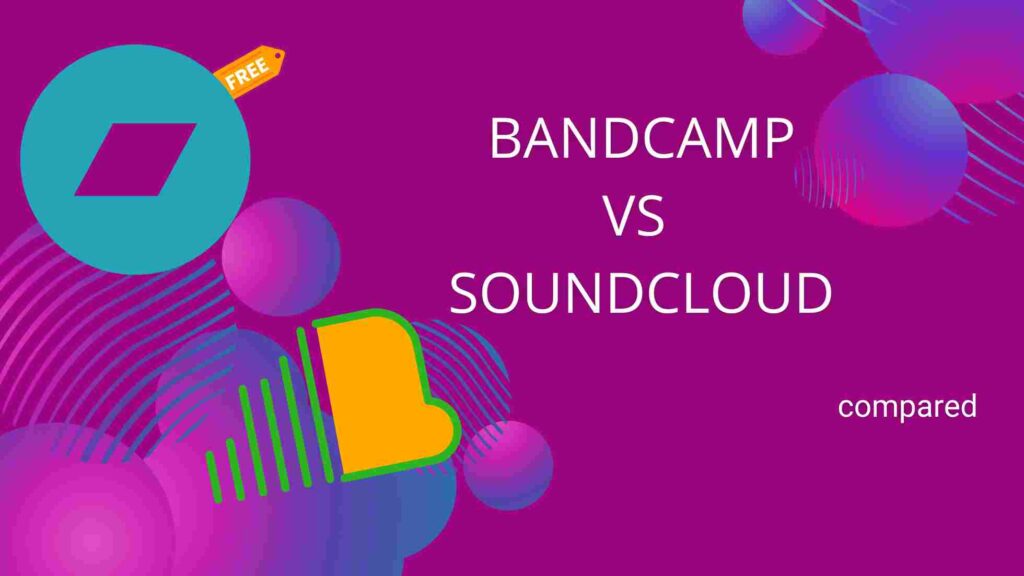Bandcamp vs SoundCloud comparison: The music industry has come a long way since the days of physical record stores and radio airplay. With the rise of digital platforms, artists now have a wide range of options for distributing and monetizing their music. Two of the most popular platforms for independent artists are Bandcamp and SoundCloud. In this article, we’ll explore the similarities and differences between Bandcamp and SoundCloud and help you determine which one is best for you.

About Bandcamp
Bandcamp is an online platform for independent musicians and artists to sell their music, merchandise, and connect with fans. Launched in 2008, Bandcamp has become a popular choice for independent artists looking for a platform to sell their music and merchandise directly to their fans.
One of the key features of Bandcamp is its direct-to-fan model, which allows artists to keep a large portion of the revenue generated from their sales. Bandcamp also offers a range of tools and features to help artists manage their profiles, track sales, sell merchandise, and connect with fans.
In addition to its e-commerce capabilities, Bandcamp also has a strong community aspect, allowing artists to connect with fans and other musicians in a supportive and inclusive environment. Fans can discover new music and engage with their favorite artists by leaving comments, sharing their music, and purchasing merchandise.
About SoundCloud
SoundCloud is a global online audio distribution platform that enables its users to upload, record, promote and share their originally-created sounds. Launched in 2007, SoundCloud has become a popular platform for musicians and audio creators to share their work with a large global audience.
One of the key features of SoundCloud is its revenue-sharing model, which allows artists to monetize their content by allowing advertisements to be played before their tracks. In addition, SoundCloud also provides a range of tools and features for artists, including music upload and sharing, podcast hosting, live recordings, and more.
Another advantage of SoundCloud is its large global audience, which provides artists with the opportunity to reach a wider audience and grow their fanbase. SoundCloud also has a strong social aspect, allowing artists to connect with fans, other musicians, and industry professionals.
SoundCloud also supports a variety of audio formats and has a proprietary audio compression technology, which helps maintain the sound quality of uploaded tracks. However, SoundCloud is also known for its strict and controversial content moderation policies, which can result in content being removed for a variety of reasons.
Bandcamp vs SoundCloud for Artists
Bandcamp is a platform specifically designed for independent artists to sell their music and merchandise directly to their fans. It offers a range of tools for artists to manage their profiles, upload and sell music, and track sales and merchandise orders. Bandcamp also has a large and engaged community of music fans, making it a great place for artists to connect with new listeners and build their fanbase.
SoundCloud, on the other hand, is a platform for all types of musicians, not just independent artists. It’s a social platform that allows musicians to upload and share their music with a global audience, and connect with other musicians, fans, and music industry professionals. SoundCloud is also great for hosting and streaming podcasts, samples, and live recordings.

Sound Quality
Both Bandcamp and SoundCloud allow artists to upload and stream their music in high-quality audio formats. Bandcamp supports a wide range of audio formats, including FLAC, ALAC, and WAV, allowing artists to offer lossless audio to their fans. SoundCloud also supports high-quality audio formats, but it uses its own proprietary audio compression technology to stream music, which can result in slightly lower audio quality compared to Bandcamp.
Difference between Soundcloud and Bandcamp
Bandcamp and SoundCloud are both online platforms for musicians and artists to share their work and connect with fans. However, there are some key differences between the two platforms:
- Purpose: Bandcamp is primarily focused on independent artists, while SoundCloud caters to all musicians, including independent artists and major label artists.
- Selling Music: Bandcamp allows artists to sell their music directly to fans, while SoundCloud operates on a revenue-sharing model where artists can monetize their content by allowing advertisements to be played before their tracks.
- Sound Quality: Bandcamp supports high-quality audio formats, including high-resolution audio and lossless compression, while SoundCloud uses its own proprietary audio compression technology. See how you can rip mp3 from Bandcamp.
- Interaction: Bandcamp provides artists with a direct connection to their fans and allows for direct interaction, while SoundCloud is more of a social platform for connection.
- Reach: Bandcamp has a smaller audience but offers a direct connection to fans, while SoundCloud has a larger global audience but less direct interaction with fans.
- Pricing Model: Bandcamp charges a 15% fee on digital sales and a 10% fee on merchandise sales, while SoundCloud operates on a revenue-sharing model.
- Features and Tools: Bandcamp offers features and tools for managing profiles, tracking sales, and selling merchandise and music, while SoundCloud offers a wider range of features, including music upload and sharing, podcast hosting, and live recordings.
- Content Moderation: Bandcamp has a more ethical and less restrictive content moderation policy, while SoundCloud has strict and controversial content moderation policies.
Which is better, Soundcloud or Bandcamp?
The better platform between SoundCloud and Bandcamp depends on the specific needs and goals of the artist.
If an artist is looking to sell their music directly to fans and build a strong connection with their community, Bandcamp is a better choice. Bandcamp allows artists to sell their music directly to fans, offers a range of features and tools for managing profiles and tracking sales, and has a more ethical and less restrictive content moderation policy.
On the other hand, if an artist is looking to reach a larger global audience and monetize their content, SoundCloud is a better option. SoundCloud operates on a revenue-sharing model, has a large global audience, and offers a wider range of features, including music upload and sharing, podcast hosting, and live recordings.
Ultimately, both SoundCloud and Bandcamp offer unique benefits and limitations, and it is important for artists to consider their specific needs and goals before choosing a platform.
What are the disadvantages of Bandcamp?
While Bandcamp is a great platform for independent artists, it does have a few disadvantages to consider. Firstly, Bandcamp doesn’t have the same reach as other streaming platforms like Spotify or Apple Music, meaning it may not be the best choice for artists looking to reach a large and mainstream audience.
Another disadvantage of Bandcamp is its pricing model, which can be more expensive than other platforms. Bandcamp charges artists a 15% fee on digital sales and a 10% fee on merchandise sales, which can add up over time and cut into an artist’s profits.
Lastly, Bandcamp doesn’t offer the same range of features and tools as other platforms like SoundCloud or Spotify. For example, Bandcamp doesn’t have its own music player, meaning artists must use a third-party player to embed their music on their website or other platforms.
Conclusion
In conclusion, both Bandcamp and SoundCloud offer unique benefits for musicians and artists looking to share their work and connect with fans. Bandcamp is a great choice for independent artists looking to sell their music directly to their fans and build a strong connection with their community, while SoundCloud is a great option for artists looking to reach a larger global audience and monetize their content.
Ultimately, the choice between Bandcamp and SoundCloud will depend on the specific needs and goals of the artist. If selling music directly to fans is the primary goal, Bandcamp is a strong choice, while if reaching a larger audience and monetizing content is the primary goal, SoundCloud is a good option. However, both platforms have their advantages and limitations and it may be worth exploring both options to determine the best fit.

Hi, I’m Lara, a music enthusiast who has a passion for discovering and supporting independent artists on Bandcamp. Lara has been a frequent user of the platform for several years and has built a large collection of Bandcamp albums, songs, and artists that she loves. Lara’s love for music started at a young age when his parents introduced him to a wide range of genres. She has been a devoted fan of indie and alternative music, and she discovered Bandcamp as a teenager.